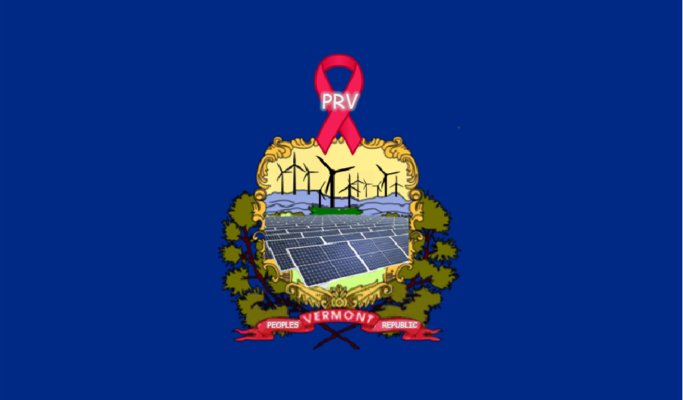When you’re getting big bucks to hold a public meeting and nobody from the public shows up, what do you do? Get one of your employees to play the role of “good citizen.” This is what happened at the first legally mandated public outreach forum that was supposed to inform the public about the Clean Heat Standard and get feedback from us folks who are about to get roadkilled by this “Mack Truck” piece of legislation, to use the description coined by Department of Public Services commissioner June Tierney.
As BTL reported earlier, only two members of the general public combined have attended the April and May public outreach meetings. (See: The Clean Heat Standard Public Engagement Fiasco.) And, as BTL also reported earlier, neither one of them had anything to say. So, to fill that awkward silence, moderator Curtiss Reed asked his colleague and Special Projects Assistant at The Vermont Partnership for Fairness and Diversity, Gemma Seymour, to vamp a little and share her own story about home heating. She did! Oh boy, did she!
Seymour must not have received the memo that her firm’s mission was to explain to the public, with a special focus on traditionally marginalized and vulnerable populations, how the Clean Heat Standard is supposed to work, because she embarked on a ten-minute excoriation of the program, illustrating in stark terms how it is too expensive, too impractical, and cannot work in the real world. Especially for those vulnerable populations the politicians promised (fingers tightly crossed) to protect.
Seymour explained that she rents an apartment in a four-unit complex in Brattleboro. She is responsible for her own heating and electric bills. Her first concern: if her landlord is forced or incentivized to spend the money to swap out the existing oil system for cold climate heat pumps or advanced wood pellets, he will certainly use it as “an excuse to raise my rent. And I don’t want my rent to go up.” Yeah, who does?
Then she makes a very good and perhaps overlooked point: “In order for the heating system in this [apartment] unit to be replaced, the unit would have to be vacated. I’d have to move someplace else for, you know, probably at least a month in order for that to be done. And in today’s housing market, how does that even happen? I mean, even if the money were available for me to just pick up and move to another place, there’s no place to move to.” True that!
She further notes that sixty-five percent of the people in her neighborhood are renters, and likely in the same boat. This is what “social justice” and “a just transition” look like under a Clean Heat Standard mandate. Nice words smashed like bugs on the windshield of reality.
Next Seymour takes a nice meaty bite out of the hand that’s feeding her to host this event, calling out the legislators who passed Act 18 for gross incompetence. “If you look at the operable part of the legislation, the obligated parties in Act 18 are the fuel dealers, and that’s it. Fuel dealers are obligated to obtain Clean Heat Credits, and the Public Utilities Commission is charged with creating a system by which this is going to happen. There’s no hard targets put into place as to how much reduction has to take place. There’s no incentives for homeowners to actually upgrade systems, or landlords to upgrade systems. It’s an expense for them that they are going to recoup in rental costs. And that’s a big red flag for everybody who rents in Vermont.” Tell it, sister!
She goes on, “In order for the oil system to be replaced in this building, somebody would have to pay thousands of dollars to have all of that ripped out. And, oh by the way, that oil tank is hazardous waste now, so that has to be handled in a certain manner. I’d have to vacate the building. Find a new place to live. And somebody’s got to foot the bill. All of which is ultimately going to make my rent go up.” Yup!
She did the math. “If I divide my $800 [annual heating bill] by nine months of the heating season, that means my electric bill [plus any rent increase] could go up ninety dollars a month before I was paying more money than I was before. Now I’m willing to pay a little bit more if it means a cleaner environment. But the reality is I don’t want to pay THAT much more.” Says the professional climate activist. How do you think everyone else feels?
But this is a sentiment that jibes with the polling done last December by Campaign for Vermont that showed while a majority people like the idea of cutting greenhouse gas emissions in theory, they have almost zero interest in paying anything extra in order to do so. And the Clean Heat Standard is going to cost LOTS extra.
So, if this is what you’re paid DEI spokesperson has to say about your signature program, I mean, good luck selling it to the general public. Which may be the strategy behind holding meeting ostensibly for the public that nobody from the public attends.
In closing, I’ll just remind Gemma, if she’s reading, not to be too shocked and surprised that she, a lower income person from a traditionally marginalized background, is getting the doo-doo end of the Clean Heat Standard stick. Senator Mark MacDonald did warn us all as he and his colleagues passed this law, “We don’t do things based on helping poor people. We’re doing things based on saving the world.” You’re just being asked to do and pay your fair share.
